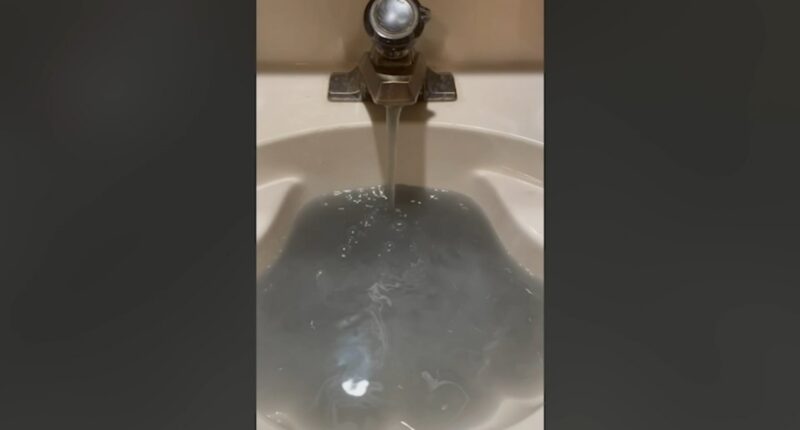Share this @internewscast.com
BEAVERVILLE, Ill. (WLS) — Imagine turning on your faucet only to be met with black, foul-smelling water.
For half a year, this has been the unsettling reality for some residents of a village where discolored water has become a daily nuisance. Seeking a lasting fix, they’ve reached out to the ABC7 I-Team for help.
ABC7 Chicago is now streaming 24/7. Click here to watch
Tonja Galderio, a resident of Beaverville, shared with ABC7 the samples she collected, vividly illustrating the state of her tap water.
“This is what came out of my hot water heater,” Galderio explained.
She added, “It’s like a slime… That’s the water from my kitchen. Try making pasta with that.”
According to Galderio, the water not only reeks of sulfur but has also wreaked havoc on her sink and clothes.
Galderio and Kathleen Butron say it all started in late May in the village of Beaverville, which is about an hour-and-a-half south of downtown Chicago.
“I have diabetes; I have to make sure my feet are very clean,” Butron said.
“Me, black water. The neighbor on the other side of me, black water,” Galderio said.
In mid-June, the village started distributing bottles of water, but that stopped in early October. Water bills were also paused but have recently resumed. But these women say they are still seeing dark water.
ABC7 emailed the village and Beaverville Mayor Gary Martell several times. When we did not hear back, ABC7 I-Team Consumer Investigator Jason Knowles went to Martell’s door.
Martell did not answer the door, but the Village Water Operator Perry Regnier answered did.
“It’s been taken care of. You need to talk to the board. I don’t have anything to do with talking to the media,” Regnier said.
When Knowles pointed out that Regnier is the water operator, he said, “I’m water operator,” and closed the door.
The Illinois Environmental Protection Agency told the I-Team that too much manganese is the cause of the discoloration.
The IEPA says the village flushed the system at the end of August and that “a large part of the filter media was missing,” and another filter was not properly operating, possibly increasing the presence of manganese. The IEPA said the filter was recently replaced.
Officials addressed the ongoing concerns in a public meeting about one week ago Monday.
When asked what it is like to have black water coming out of her faucet, Galderio became emotional, saying, “It’s hard.”
The IEPA says while the water is not aesthetically pleasing, the levels of manganese are within range and safe to drink.
The I-Team analyzed 33 IEPA drinking water reports for Beaverville from the last two years and found that the village’s water system contained more than the federal EPA’s aesthetic standard of 50 parts per billion, for manganese, in three tests. One report found manganese levels above 90 parts per billion, nearly twice the federal aesthetic standard.
None of the tests were over 100 parts per billion, but Dr. Tasha Stoiber from the Environmental Working Group says if manganese levels ever went above that 100 ppb number, then babies drinking formula prepared with water could be at risk.
“You would flag those tests of that critical population during those critical stages of development,” Stoiber said.
Stoiber also says dark sediments can be concerning.
“It could spike those concentrations. It doesn’t look good, doesn’t taste good. How do you wash your dishes? How do you wash your clothes? It becomes unusable,” Stoiber said.
A September private analysis of the two residents’ homes in our story found manganese levels at 40 parts per billion, just below the U.S. Environmental Protection Agency’s aesthetic standard. But it also found that the water system’s iron concentration is more than six times the EPA standard. Experts say that it is not inherently dangerous, but it is also contributing to the discolored water and unusual taste.
“And I don’t think anybody would want to drink it, to be honest with you, and even just to bathe in it,” Butron said. “It’s just not right. I mean, I just feel like we’re all due clean water.”
The IEPA says it is committed to working with Beaverville officials to address issues. The village has also faced two recent violations: one related to sample monitoring, and another on a failure to install a “corrosion control treatment,” used to address and/or in copper within the system.
The IEPA says it is working to fix these violations and that testing has shown the water is safe.

















